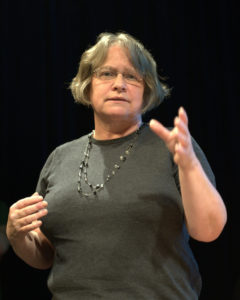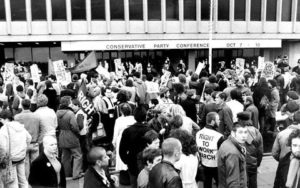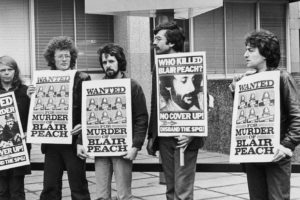UCPI Daily Report, 12 May 2022
Tranche 1, Phase 3, Day 4
12 May 2022
With the current Undercover Policing Inquiry hearings’ opening statements concluding yesterday, today saw the first day of evidential hearings. Testimony came from Dr Lindsey German, a witness who knew several undercover officers from the period covered in Tranche 1 of the Inquiry (1968-82) from her time in the Socialist Workers’ Party.

Dr Lindsey German
Dr Lindsey German was active for 30 years in the International Socialists (later the Socialist Workers’ Party or SWP). She was made a full-time student organiser in 1975, became the District Organiser for Central London in 1977 and was appointed to the Central Committee in 1979. She later helped found and lead the Stop The War Coalition.
However, today’s evidence focused only on the Inquiry’s Tranche 1 period (1968-1982). A detailed account of German’s political background can be found in her written statement to the Inquiry.
At least 24 undercover officers have spied on the SWP, recording such personal details as physical appearances, holiday plans, weddings, sexuality, and childcare arrangements.
INQUIRY OR TRIAL?
Before German’s questioning began, the Inquiry’s Chair, Sir John Mitting, responded to her witness statement, in which she addressed various common misconceptions and preconceptions about the SWP’s aims and tactics.
Mitting was keen to assure her that he and his team do not have any preconceived views. However, their approach to questioning, and their loaded use of the word ‘revolutionary’, showed they clearly do.
At times it seemed like German was on trial, to the extent she observed that:
“A lot of the questions this morning have been about my politics, rather than the role of the undercover police, which is the aim of the Inquiry.”
She was not put off by this, using it as an opportunity to correct the Inquiry and share her views of how a more just and democratic society could come about.
Nevertheless, the Inquiry’s hostile approach to questioning members of the public who were spied upon could put off future witnesses. This concern has been raised by a number of victims of spycops’ abuses, who do not want, and should not have to, defend themselves against the Inquiry’s preconceived views and thinly-veiled attacks.
IMPROVING DEMOCRACY
Under questioning from David Barr QC, Counsel to the Inquiry, German talked about the aim of the SWP to replace Parliament with things like Workers Councils: “a higher version of democracy than we have now”. However, in her opinion, these revolutionary aims were never close to fruition in her time with the SWP.
Barr asked a series of questions about whether the SWP sought to “escalate” industrial disputes and “confront” fascism. He questioned German’s “critical view of the police” and the security measures taken by the SWP at their National Delegate conference [UCPI0000013228] in 1978.
German responded that a more assertive attitude by workers was the best strategy, something that had also been trade union policy, as well as the SWP. She gave context about the growth of fascism and how her relatives had fought fascism in World War Two.
She explained that the SWP’s security stemmed partly from fears of state surveillance and blacklisting – fears, that it turned out, were entirely justified – and added the threat from the far-right.
POLICE BIAS
German explained her views of police bias, in terms of crimes prosecuted and the fact that they are used as a force of repression. These views are backed up by the evidence currently before the Inquiry, which shows the police planning to attack demonstrators and treating the far-right much more favourably than the left. In her view, she confirmed, the institution of the police does not benefit the working class.

Right to Work march at the Conservative Party conference, Brighton, October 1980
Barr made a large jump from that statement to ask if that meant she thought the police were “fair game” for physical violence in the streets. He asked whether if the police outside outside Conservative Party conferences – for example those who policed the Right to Work demonstration outside the one in Brighton in 1980 – [UCPI0000015888], were fair game for protecting the elite? Was it therefore legitimate to push through their cordons?
He pressed this point several times. German calmly argued that the question implied a misconception about whether people planned violence at demonstrations. They didn’t.
INTERACTION WITH OTHERS
Barr then went on to ask about a number of other organisations: School Kids Against the Nazis (SKAN), Women’s Voice, Rock Against Racism, Campaign for Nuclear Disarmament, and armed Irish republican group the Provisional IRA(!)
We’ve already heard how the spycops of the Special Demonstration Squad (SDS) targeted youth organisations like SKAN at the Security Service’s direction.
German agreed the SWP was involved in SKAN, however she said that it was a broad front and ‘larger groups’ joined the fight against fascism. The SWP were a minority in that organisation.
Women’s Voice was different, it was not a broad front type organisation, it was an organisation of socialist women. While Rock Against Racism was different yet again, formed by a small group of people in reaction to racist comments made by Eric Clapton.
Barr asked if the SWP had a “surreptitious” approach to “controlling” the Campaign for Nuclear Disarmament (CND). She dismissed the claim, saying the SWP was open about and localised in its approach to CND.
She did agree that the SWP wanted CND to be “more militant” – not by doing more direct action (something that CND already did, and continue to do, a lot of), but by making more links with trade unions and the working class, and being more collective.
ARMED STRUGGLE
Barr then pressed German on the SWP’s support for “the armed struggle” [UCPI0000015994], particularly in Ireland. She replied that the SWP supported the Provisional IRA’s aims but not their bombing campaigns; she could support attacks on military infrastructure but not the bombings of pubs or other targets.
We were shown another Special Branch report [UCPI0000019543] about a party held at the home of SWP organiser Chris Harman. Somebody who attended the party, a former IMG member who had lived in Belfast, allegedly ‘while somewhat the worse for drink’, spoke of being ‘trusted by’ the Provisional IRA and ‘fully sympathetic to their cause’.
Barr asked how common such views were within the SWP.
German didn’t think this report was true. This person was involved in the H blocks campaign, seeking political status for IRA prisoners, and in supporting the hunger strikers – something that enjoyed wide support at the time.
Ironically, we know that if the SWP really were directly involved with the Provisional IRA, they probably wouldn’t have been spied upon; the SDS’s 1976 Annual Report stated it was policy not to infiltrate groups directly connected with the Provisionals as this would be too dangerous for the spycops.
CONFRONTING FASCISM
After a break, Barr’s questions moved to the relationship between the SWP and the far-right. He started with events in Red Lion Square in June 1974. The fascist National Front had booked Conway Hall for a rally, and a broad range of organisations organised a counter-demonstration to stop them.
At the time German was a student at the nearby London School of Economics, a short walk away. She recalls that journey, and the huge number of police vans she saw on the way:
“I’m not surprised that somebody died on that day. It was very very heavily policed and in a very violent way”.
The police pursued demonstrators, attacking them with truncheons and even throwing some over the railings into the underpass on Theobalds Road. During charges into the crowd by mounted police, Kevin Gately, a young student from Warwick, was killed.
German said:
“We didn’t go looking for trouble, we weren’t the people who created the trouble.”
Rather, the police had put a huge operation in place because they were determined to ensure the fascist event would go ahead.
Barr mentioned Lord Scarman’s inquiry after the event, saying that he “fairly and squarely put the blame on the IMG [International Marxist Group]” who “assaulted the police in an unexpected, unprovoked and viciously violent attack”.
German disagreed: “that’s not an accurate description”, pointing out that Gately was an IMG member, and:
“they were demonstrating perfectly acceptably.”
THE BATTLE OF LEWISHAM
![Anti-racist protesters, Lewisham, 13 August 1977 [Pic: Syd Shelton]](http://campaignopposingpolicesurveillance.com/wp-content/uploads/2021/05/Anti-racist-protesters-Lewisham-13-August-1977-300x195.jpg)
Anti-racist protesters, Lewisham, 13 August 1977 [Pic: Syd Shelton]
German pointed out that the “bizarre” report should be taken with a big pinch of salt, especially as there is no other evidence of this. It was down to her (not Barr) to comment on the language used by the author, saying “even in the 70s people didn’t talk like that”.
She also reminded Barr that this was a dangerous time for socialists, as well as Black and Asian people – fascists would attack people on the tube for wearing anti-racist badges. The SWP believed that combatting racists should be done collectively, involving the trade unions and wider groups.
“We were very careful, we didn’t want this to become a kind of individual gang fight between left and right”.
Barr had brought this up because he wanted to ask German about the August 1977 events that became known as the ‘Battle of Lewisham‘, and the SWP Central Committee’s attitude towards the anti-fascist counter-demonstrations that had been planned for that day.
German was at a by-election in Birmingham at the time of the Lewisham demonstration, and was not a member of the SWP’s Central Committee until 1979. Nevertheless, she patiently explained why it was so important to oppose a fascist demonstration that had deliberately chosen to walk through a multicultural community. It was a consciously provocative and intimidating act.
Indeed, not seeking to prevent the fascists marching would have been a mistake, as the consequence of not coming out on the streets (in Lewisham or anywhere else) would be more attacks on Black people – much, much worse.
Pressed, German provided more detail on the SWP’s approach to demonstrations, explaining that the SWP had an extensive stewarding operation:
“We wanted to make sure people could get to marches safely, that they would take place in a collective, disciplined way and not descend to individual fighting. We put a lot of effort into that.”
When asked about their use of obstruction as a tactic, she explained that they would occupy the road in order to prevent fascists from marching into areas where they might cause trouble. There were more than 50 racist murders of Black and Asian people in those years and the SWP felt strongly about this issue. There should have been official recognition that the National Front marches were unacceptable.
Nobody wanted the National Front in Southall – pretty much the entire community there were very clear about not wanting the fascists in their area, yet the police went out of their way to let that rally happen in 1979. There was a huge counter-demonstration, which SWP members attended, and this is when the police killed Blair Peach, who was a member of the Party.
Eventually, the Met banned all National Front marches in 1981.
German also gave examples of successful community resistance to the National Front such as occupying the space at the top of Brick Lane to stop them selling fascist papers there, painting over racist slogans, dealing with racism in ‘low-level ‘ways in workplaces, etc.
SPYCOPS IN THE PARTY
Finally, towards the end of the morning, Barr’s questioning moved to the activities of some of the spycops themselves. German was involved in the Right To Work campaign. In 1981 she spent three weeks on a Right To Work march – as did an undercover officer using the name ‘Colin Clark’ (officer HN80, 1977-1980).
She says that Clark put himself very much at the centre of the operation – “presumably to find out as much information as he could”. He took part in most of the day to day decisions, about money for food, etc, but also important discussions such as how to avoid dangerous situations or prevent young people who joined the protest march from being arrested.
Looking back, German said:
“It’s very disturbing that he was in this position… I feel uncomfortable, it’s disquieting…I find no justification for it whatever.”
After a brief detour to ask his characteristic questions about “trouble” during that Right to Work march (spoiler: there wasn’t any), Barr cited a 1982 report [UCPI0000015888] containing details of donations (including small ones) made to the campaign. This information was meant to be confidential, but it was hoovered up by the SDS.
The Inquiry sought a better understanding of the way the campaign (and the SWP) was organised and how these donations were dealt with. There were a number of questions about the office and headquarters, about the different positions within the SWP structure, and what these levels meant in terms of access to information and involvement in decision-making.
German explained that although some people in leadership roles worked from home, they would also come in to the office. Those who worked in the office would come along to meetings and social events, trips to the pub, etc.
She remembered some of the spycops – she says they attended social events and generally kept a fairly low profile. Some, like ‘Phil Cooper’ (officer HN155, 1979-1984), although not on the SWP’s Central Committee would have had some influence over what was going on. Of most concern, though, is the level of access to information of all kinds – people’s names and personal data, Party finances, etc – that he would have had. [UCPI0000011563]
TRIPE
Barr then moved on to a series of reports from October 1977, 1979 [UCPI0000013669], 1980 [UCPI0000013961], and 1983 [UCPI0000015986], all of which mention German by name.

Blair Peach protest
TThe spycops had reported back about her appointment as a new District Organiser, and then her promotion to the SWP Central Committee and role of as ‘Women’s Organiser’. They reported on her attending a Blair Peach demo on the first anniversary of his death.
One exhibit said that the photo they had of her on file was no longer a good likeness, and requested a new one. The last detailed her new address and living arrangements.
Barr wanted German’s reaction to all of these. She described the last report as “tripe”, dismissing it as inaccurate and pointless. She said these reports represented a completely unjustified level of intrusion, and pointed out that much of the information they contained was in the public domain. Events such as the SWP National Conference at Skegness were advertised publicly.
Blair Peach was her neighbour, someone she regularly saw and spoke to. The demo where he was killed was described by someone she knew as “the most violent demonstration he’s ever been on”.
“We know that Peach was murdered by the police”.
That the spycops reported the SWP used his death “for their own ends” was a “complete disgrace”, saying more about the mindset of the undercover police and their attitudes towards those who demonstrated.
German said this Inquiry must address the “appalling way” the police treated “people who were going about perfectly legitimate political activity”.
SPYCOPS AT THE PARTY
After lunch, Barr pulled up more reports, from the Easter rallies the SWP held in Skegness in 1980 [UCPI0000014551] and 1982 [UCPI0000018180].
According to German, these weekend-long events in Skegness were part holiday/ social, part political. Many of those who attended were not party members or politically involved – some “just went there because the wanted a good time” – others accompanied their partners – many people brought their children.
These two reports contain long lists of attendees’ names (running to 50 pages). Barr pointed out the words “no trace” after many of the names – suggesting that Special Branch ran searches on all the names and this was the first time that many of these people had come to their attention. Some of them were only there as paid entertainers, comedians and the like.
German confirmed that these lists of names, as well as other documents displayed by Barr, containing internal Party statistics [UPCI0000016148], and the phone numbers of the SWP secretariat [UCPI0000016582] would have been confidential, as would the level of detail in thereport of the SWP’s 1980 National Delegate conference [UCPI0000016619].
German stated that there was no justification for this level of intrusion from the police. She concluded the police “simply wanted to put the Left in a very bad light.”
Notably, there was no such infiltration of the National Front, an obviously political decision.
Asked for her reflections on the spycops operation, she said it represented a big effort and a lot of public money for very little results.
Mitting had a few questions for her at the end of the day. He noted that electoral candidates – even the National Front – were legally permitted to hold election rallies in public buildings , to make some kind of point:
“I accept that you objected to it, but you knew that the law of the land actually provided that they were entitled to make use of these places?”
The Inquiry’s Chair then thanked her for her time, inviting her back for Tranche 2 – covering 1983-92, expected to occur in 2024 – “health and intellect permitting of course – that goes for both of us”, he laughed.
With that slightly disturbing ‘joke’, suggesting that ongoing delays to the process will continue to result in many witnesses, and perhaps even Mitting himself, being too dead, infirm or mentally incapacitated to take part, Day Four of this round of hearings came to an end.
Follow Lindsey German on Twitter: @LindseyAGerman
Witness statement of Lindsay German
Full list of associated publications
Video and transcript of the day’s hearing
The current round of Undercover Policing Inquiry hearings, focusing on Special Demonstration Squad managers 1968-82, continue until Friday 20 May.
